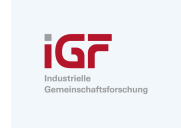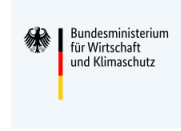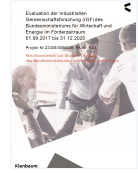
The Federal Ministry for Economic Affairs and Climate Action has had the Industrial Cooperative Research funding line evaluated for the past three years. In the process, 9 experts from Kienbaum Consultants International GmbH prepared an expert report that examines the IGF programme from various perspectives using qualitative and quantitative methods for data collection within the stakeholders from industry and science.
The results are impressive:
Within the funding landscape, the IGF ranks very well with its pre-competitive and open-topic collaborative research. There is no significant duplication with other funding programmes.
In interaction with other funding lines of the BMWK, the IGF is confirmed to have positive synergy effects. In the area between "pre-competition" and "market closeness" within the research chain, the study confirms that the BMWK funding lines IGF, INNO-KOM, WIPANO and ZIM interact well and sensibly in terms of content.
Within the IGF, the study shows the important role of the research associations. As a link between the actors, they act in key functions within the innovation process, from the generation of ideas to the submission of applications, the forwarding of funding and the transfer of results. The research associations are also said to contribute to the creation and strengthening of networks, to the multiplication of research results and to the representation of the interests of industry. A close exchange with research institutions and industry (especially SMEs) is evident, as well as support for quality assurance in applied research due to a standard participation opportunity for industry in the IGF.
According to the study report, industry (and especially SMEs) are primarily offered four points of contact within the IGF: Contribution of ideas, content-related project support and assistance, utilisation of project results, and expert activities in the innovation process itself.
For the actors, the focus is primarily on technical and content-related aspects, which leads to a continuous setting of current topics for industrial application research and at the same time promotes the development of orientation knowledge for all.
The IGF is said to facilitate SMEs' access to research results, which means that research work no longer has to be self-financed. Only limited internal capacities are tied up in the SMEs, and yet a multiplication of know-how in the company is promoted. An IGF contribution could also be shown with regard to the obstacle of the lack of skilled workers.
According to the final results, the IGF proved to be an effective funding instrument during the period under review. According to the report, the effects achieved with the funding make a significant contribution to achieving the programme objectives: "... the IGF (has) demonstrated its unique character in the German (and European) funding landscape for many decades and thus represents an important part of innovation funding in Germany. This is also demonstrated by the fact that the IGF forms synergies with a number of other funding programmes."
The most important conclusion recommended in the report is: "Continue IGF funding program".
The Research Association for Steel Application (FOSTA) welcomes the presentation of these positive effects from the IGF funding programme of the BMWK. We ourselves see the positive effects of industrial collaborative research on the participants from industry and science in a large number of steel application research projects.
We are happy to take up the recommendations mentioned in the results report for optimising the programme with regard to the future transfer of results, the advancing digitalisation in research management, the support of funding lines for interdisciplinary topics and the leveraging of further potential in the funding process and advocate their corresponding implementation.
| 



